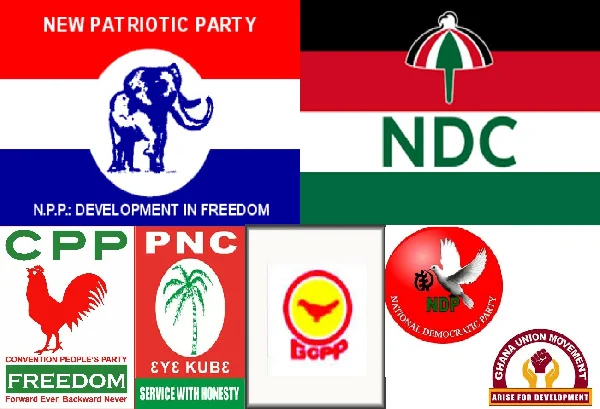Ghana’s upcoming election highlights & growth obstacle posed by corruption – Edwin Austin Writes

With Ghana’s hotly-contested presidential election just three months away, the two leading parties released their manifestos in the second half of August setting out competing roadmaps out of the country’s worst economic crisis in a generation.
The ruling New Patriotic Party (NPP), led by current Vice President Mahamudu Bawumia, has promised to “create jobs, empower the youth,…and unleash the potential of the private sector to drive Ghana’s economic transformation,” while expanding educational access and key infrastructure.
On the other hand, the National Democratic Congress (NDC), Ghana’s main opposition party hinged on former President John Mahama also unveiled an eye-catching $10 billion stimulus plan on 24 August to revive the beleaguered economy.
Citing what he referred to as the “abysmal performance” and institutionalised corruption of outgoing Akufo-Addo administration at the NDC manifesto launch, Mahama positioned his party as a champion of accountability and good governance. Moving forward, Ghana’s future government will need to tackle public transparency and corruption issues to ensure a robust and prosperous private sector that delivers for its citizens and fuels economic development.
Are corruption scandals like G4O exacerbating Ghana’s economic crisis?
In recent years, Ghana’s economy has been marred by soaring inflation, unemployment and currency depreciation, leading to a $3 billion IMF support package after Accra defaulted on the majority of its $30 billion external debt in 2022.
While exogenic shocks have certainly exacerbated Ghana’s economic woes, NPP critics have equally pinned the blame on apparent government failures, from years of reckless borrowing to alleged increases in graft during Akudo-Addo’s tenure. Mahama has framed the December poll as a key opportunity to “reset Ghana and turn the tide” on state-driven corruption, notably vowing to prosecute outgoing government officials associated with a string of problematic government contracts.
For example, Mahama has pledged to investigate the NPP’s “opaque Gold-for-Oil deal,” (G4O) a government initiative aimed at stabilising domestic fuel prices and reducing the country’s dependence on foreign oil markets by securing oil imports using gold purchased with Ghanaian cedis. An apparent lack of transparency in awarding contracts to deliver the G4O is of particular concern, with NDC economic spokesperson Isaac Adongo recently highlighting how Ghana’s Auditor-General has not found “any agreement covering the Gold for Oil arrangement.”
Dubious procurement processes have become a pattern in Ghana in recent years, unfortunately, raising questions about whether institutionalised corruption is undermining Ghana’s economic recovery and tax generation capacities is another problem on it’s own.
Fuel marking scheme reflects deeper problem
Beyond G4O, the current administration’s National Petroleum Authority (NPA) appears to have controversially extended its anti-illicit trade fuel marking contract with private sector providers Authentix and Nationwide Technologies Limited (NTL), only months before the elections.
Initially launched with Authentix in 2012, the NPA’s National Fuel Marking Scheme was most recently extended in April 2022 for a two-year period. This contract’s renewal notably elicited corruption allegations and an Office of the Special Prosecutor (OSP) investigation into claims that it had violated Ghana’s procurement law, including bypassing the requirement for multi-year contracts to receive Parliamentary approval.
Aside the contractual issues, it is crucial to investigate emerging concerns about whether the fuel marking solution is fit for purpose. Kits associated with Authentix’s solution have already been found to be defective in other countries, such as Kenya, while in Ghana, industry experts have equally sounded the alarm over the solution’s questionable impact.
For example, Chamber of Petroleum Consumers (COPEC)-Ghana Executive Secretary, Duncan Amoah, has highlighted the ineffectiveness of the scheme in curbing a thriving illicit trade depriving the state of millions in tax revenue. Even the NPA has acknowledged the system’s high failure rates, begging the questions of why the scheme would be extended given the urgent need to boost tax revenue and reboot Ghana’s economy.
BOST, SML and Tata controversies painting a damning picture
The fuel marking contract could become just Ghana’s latest procurement scandal. Take the high-profile corruption within the state-run Bulk Oil Storage and Transportation (BOST), which came under fire in 2017 for selling roughly five million litres of contaminated fuel at discounted prices to unlicensed companies, robbing public coffers of GHC7 million. The committee tasked with investigating the BOST scandal notably expressed its opinion that the fuel had been intentionally downgraded, while also discovering that the NPA had awarded fuel tank cleaning contracts to these same unlicensed companies.
More recently, Dr. Arthur Kennedy shed light on the contract awarded to Strategic Mobilisation Limited (SML) by the Ministry of Finance and Ghana Revenue Authority (GRA), asserting that this contract for downstream petroleum auditing services was “awarded illegally.” Moreover, according to the Fourth Estate’s year-long investigation into the SML affair, the company has “made false and unsubstantiated claims” concerning its services to justify its GHC24 million monthly payments – services which procurement expert Kobina Ata-Bedu has stated SML had no experience or expertise in prior to being awarded the contract.
From the National Cathedral project, whose state-funded budget has quadrupled to $400 million, to the GRA’s unilateral awarding of Ghana’s domestic tax mobilisation system to India’s Tata Consultancy Services’s from 2026 – just months before the ruling party faces potential electoral defeat – the list of dubious procurement practices goes on.
An opportunity for change
As governance and security policy analyst Dr Michael Richmond Smart-Abbey has rightly written in the wake of the NDC manifesto launch, “maladministration” by the outgoing government has caused significant socioeconomic suffering for “the masses, especially the youth,” while enabling the political elite to further enrich themselves. The upcoming elections provide an opportunity for Ghana to break the cycle of institutional corruption and boost economic development.
The NDC’s “rescue mission” for Ghana has rightly identified poor governance and economic mismanagement as the key enemies of a brighter future for the Ghanaian people. By rooting out corruption in critical industries, a future administration would create the conditions for sustainable growth while generating the tax revenue needed to fund an ambitious programme of social and infrastructure investment and pull the country out of its economic crisis.
Source: Edwin Austin East Africa Investigative Journalist




